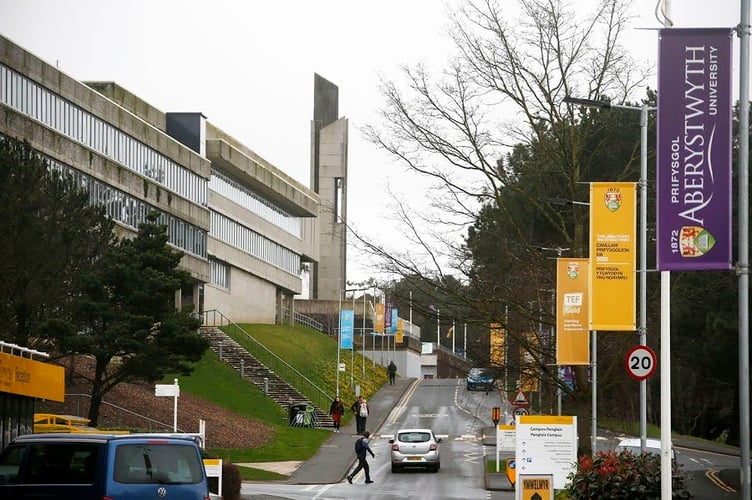Aberystwyth University has posted an £8.1m deficit and the institution’s annual report warns the situation “will get worse before it gets better” with more than £14m in savings identified in a bid to balance the books as part of a large-scale ‘transformation programme’.
The university released its annual report for 2023/24 at the end of January, which says that “reductions in income and increases to costs resulted in a deficit operating position for the academic year.”
“Savings plans were put in place to mitigate these factors and realised significant sums, but these were not sufficient to meet the budget target,” the report said.
In response to a financial crisis, the university launched a ‘transformation programme’ early last year to identify job cuts to help reduce spending, with the university saying it had no plans to close any of its schools or departments while it works its way back into the green.
There was a net loss of 23 jobs during 2023/24, with that number set to rise significantly under the university’s ‘transformation programme’ in the next set of accounts.
Staff costs increased by more than £2m “due to the impact of pay awards and incremental movements,” the report said, while more than £2m was paid on ‘restructuring costs.’
University fee caps in Wales will rise to £9,535 a year from September, following an increase from £9,000 to £9,250 last September - before the latest accounts were compiled - but Aberystwyth University warned the rise is still not enough to balance the books despite an uptick in domestic students enrolling, with international student numbers falling along with research funding and grant income.
For 2024/25, the university is targeting a deficit budget of £3m which will “require delivery of significant savings alongside retaining our student market share,” the report says.
“We have successfully recruited student numbers to within one per cent of our target and are making good progress on savings with £12.9 million of the £14.3 million target identified,” the report adds.
While shedding jobs to cost cuts, the university has spent more than £10m on decarbonisation and energy efficiency measures in the last four years in a bid to become carbon neutral by 2030, the report says.
Aberystwyth vice-chancellor Jon Timmis, appointed to the role in November, said in his introduction to the report that “universities across the United Kingdom are facing challenges on several fronts.”
“Hit by years of high inflation, tuition fees have not kept up with increasing costs, although there was the announcement that fees would increase from the 2024/25 academic year.

“Coupled with that is an increasingly challenging overseas student recruitment landscape.
“Aberystwyth University is no different from our fellow institutions in facing those challenges.
“International students are becoming less keen to study in the UK for a variety of reasons.
“This leaves gaps for universities to fill and leads to an even more competitive battle for domestic students.
“Our student base has grown year on year but we did not attract as many students as we had budgeted for.
“This, coupled with persistently high operating costs, has led to the university posting a deficit for the financial year.
“It seems fair to predict that many fellow institutions will be in a similar position.
“In response to the challenges we face as an institution and which are shared by the wider higher education sector, in early 2024 we launched a Transformation Programme that would result in new ways of working to become more efficient and save costs, deliver an outstanding student experience, undertake world-leading research and at the same time look for new opportunities to generate income.”
Chair of Aberystwyth University Council Meri Huws said: “The Welsh Government’s decision to increase the domestic tuition fee cap will help reduce pressure on universities across the country.
“However, the lack of increases over the prior decade has left a deep mark on our sector finances.
“That, plus continuing high levels of inflation affecting running costs, has resulted in a tough year for this university and others.
“It is a situation that will get worse for the higher education sector before it gets better.”
In a statement, Aberystwyth Students’ Union said it has “worked closely with the university over the past year to understand the challenges faced and to develop a sustainable financial plan that minimises negative impacts on the experiences of current students as much as possible.”
“While we understand that some changes have been necessary, we empathise with those students who have been affected by them or who have felt uncertainty during this difficult time,” the union said.
“Undeb Aberystwyth firmly believes that the university's annual report highlights the funding difficulties affecting the whole higher education sector at this time.
“Universities are a public good, delivering wide-reaching social, cultural, and economic benefits beyond just serving current students and ensuring the long-term sustainability of the HE sector must be a government priority.
“The responsibility of ensuring access to education and a vibrant and positive university experience should not fall solely on institutions or students through further cuts or fee increases.”
Universities Wales warned there is an “ongoing and urgent requirement for government to support Wales’ universities so that they can continue to deliver the economic and social benefits that are felt in every part of the country” after it revealed Wales’ universities face a combined deficit of £70m, and the Welsh Government has said that no more funding was available for the sector.
In a statement Universities Wales said: “Welsh universities are facing some of the most pressing, difficult financial circumstances in recent memory.
“When USS pension adjustments are taken into account, we expect the most recent financial statements for universities in Wales to show that underlying costs have again increased faster than income, with an expected aggregate underlying deficit for the sector of around £70m in 2023-24.
“It’s important to note that these figures do not reflect more recent pressures, such as increased National Insurance contributions, or the significant shortfall in international recruitment experienced this academic year – both of which have exacerbated the incredibly challenging circumstances our universities are facing.”
An Aberystwyth University spokesperson said: “Challenges shared by all higher education institutions across Wales and the United Kingdom, such as persistent high inflation, fees failing to keep up with increasing running costs, and declining international student recruitment markets, led to the university posting an operating (trading) deficit of £8.1 million, which included several one-off historic and technical non-cash adjustments.
Prof Timmis said that “despite the challenges the university’s position has been “further solidified in recent months” by “bucking the trend of student recruitment with a rise in overall numbers” and “substantial progress” on planned savings measures announced in May last year.
Prof Timmis added: “We have a strong foundation on which to respond to the well-documented challenges facing the higher education sector.
“The university’s Transformation Programme is a long-term project but one that will deliver real and necessary change to maximise our strengths and adapt for the years ahead.
“Despite the well-known pressures on all universities, the actions we’re taking now will mean we’re a stronger, more resilient institution, with a renewed sense of optimism for the future.”




